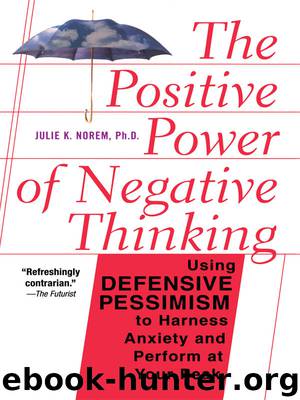The Positive Power Of Negative Thinking by Julie Norem

Author:Julie Norem [Norem, Julie]
Language: eng
Format: epub
Publisher: Basic Books
Published: 2008-08-05T03:00:00+00:00
NEGATIVE SELF-KNOWLEDGE AND SELF-IMPROVEMENT
Small and specific also turn out to be the keys to understanding the negative parts of the defensive pessimists’ self-concept. Overall, defensive pessimists tend to score lower in self-esteem than strategic optimists (though they score higher than other anxious and pessimistic people). Rather than look just at the amount of self-esteem people report, however, my colleagues and I conducted several studies in which we asked people to tell us about the actual content of their beliefs about themselves.
Defensive pessimists do use some positive characteristics to describe themselves; their view of themselves is far from monolithically bleak and dark. Katherine knows, for example, that she is an innovative researcher and admirably thorough, as well as a loving wife and a dependable friend. Daniel knows that he has a good sense of humor and excellent problem-solving abilities when it comes to architectural design.
Defensive pessimists list more negative characteristics to describe themselves than strategic optimists, but the kinds of negative descriptions they generate also differ from those of other anxious people. When defensive pessimists describe their faults, they tend to be very specific and precise, in contrast to the more global or general descriptions of avoidant pessimists, for instance. Daniel might say that he has a tendency to stray from the point when he is writing and that he doesn’t compliment his subordinates enough. Mindy, in contrast, will describe herself as a terrible writer and as too judgmental toward everyone.
Daniel and Mindy may both be right about themselves, and they may be very similar in these relatively negative characteristics. However, in the same way that more global attributions have different implications for the future than more specific attributions, the abstractness or concreteness of the way we think about ourselves has implications for how difficult or easy it will be to accomplish change. If you wake up in the morning thinking that you are lazy, then no matter how much you would like to change that, it isn’t clear how you would start.What’s the first step in becoming un-lazy? If, on the other hand, you think of yourself not as someone who is generally lazy, but instead as someone with a tendency to procrastinate, then that more concrete assessment leads more clearly to potential plans for tackling what is a much more manageable (though not necessarily simple) problem.
Download
This site does not store any files on its server. We only index and link to content provided by other sites. Please contact the content providers to delete copyright contents if any and email us, we'll remove relevant links or contents immediately.
Rewire Your Anxious Brain by Catherine M. Pittman(18654)
Talking to Strangers by Malcolm Gladwell(13370)
The Art of Thinking Clearly by Rolf Dobelli(10487)
Mindhunter: Inside the FBI's Elite Serial Crime Unit by John E. Douglas & Mark Olshaker(9339)
Becoming Supernatural by Dr. Joe Dispenza(8214)
Change Your Questions, Change Your Life by Marilee Adams(7780)
Nudge - Improving Decisions about Health, Wealth, and Happiness by Thaler Sunstein(7706)
The Road Less Traveled by M. Scott Peck(7601)
The Lost Art of Listening by Michael P. Nichols(7506)
Mastermind: How to Think Like Sherlock Holmes by Maria Konnikova(7342)
Enlightenment Now: The Case for Reason, Science, Humanism, and Progress by Steven Pinker(7311)
Win Bigly by Scott Adams(7194)
The Way of Zen by Alan W. Watts(6614)
Daring Greatly by Brene Brown(6512)
Big Magic: Creative Living Beyond Fear by Elizabeth Gilbert(5771)
Grit by Angela Duckworth(5614)
Ego Is the Enemy by Ryan Holiday(5445)
Men In Love by Nancy Friday(5239)
The Laws of Human Nature by Robert Greene(5208)
